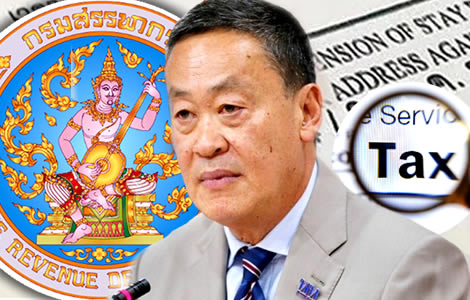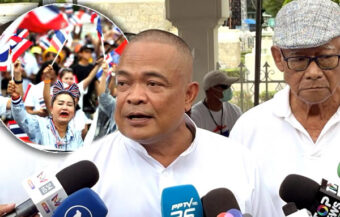The tax change which has already been defended by Prime Minister Srettha Thavisin as a move against income inequality, is coming with Thailand in talks with economic powers such as the European Union to put in place new trade and investment pacts. It comes after the previous government had launched long-term visa regimes highlighting the zero tax imposed by the Thai government on income not generated in Thailand. This new move is already causing anxiety among foreigners living in the kingdom with passive income from abroad as well as retirees who are still thought to be exempt from tax. However, for the new tax regime to generate extra revenue to fund government stimulus efforts, some foreigners must end up paying more.
There are growing concerns among foreigners about moves by the new Thai government to widen the country’s tax base. They fear this could lead to all incomes earned by foreign residents in the kingdom being subject to tax. It follows an announcement by the Revenue Department in mid-September which is leading to calls for greater clarification and indeed for the government to make it clear that there will be no attempt to impose tax on retirement or pension income from abroad.

On September 15th, the Revenue Department in Thailand issued a clarification stating that from the 1st of January 2024, it planned to tax foreign income on all individuals in the kingdom who have been resident in the country for over 180 days.
Speaking in the last week about the announcement, new Prime Minister and current Minister of Finance, Srettha Thavisin, suggested apologetically that the move was a push by his government to increase tax receipts and the kingdom’s tax base to fund such measures as the ฿10,000 giveaway which is scheduled to proceed on the 1st of February 2024.
This will disburse ฿10,000 in digital credits to over 55 million people in Thailand over the age of 16 years.
More tax receipts needed by the new Pheu Thai-led government to pay for economic stimulus measures such as the ฿10,000 Digital Wallet says the new PM
The new government estimates that the cost of this measure alone will be ฿560 billion.
Speaking to the announcement, Mr Srettha did not pull any punches and strongly justified the move to bring foreigners into the tax net based on addressing Thailand’s chronic levels of inequality, which are thought to have widened since 2018, even before the pandemic crisis, and during that period to have been exacerbated further again by trends in the economy.
It is accepted by most analysts that the wealthiest in Thailand have earned more while those who are most vulnerable have earned less because of the pandemic crisis. What has been less speculated on is the growing number of foreigners who are tax resident in the kingdom.
Up to this year, figures kept by the Thai government only focused on foreigners who were registered as employees or self-employed with the Revenue Department with figures for the first three months showing that 156,596 fit into this category.
The top three nationalities for these workers are Japanese, Chinese and Indian.
Difficulties ascertaining the exact number of foreigners in Thailand due to different kinds and constant movement driven by tourism and migration
There are problems identifying the exact number of foreigners in Thailand with no official data available but it is known from Thai authorities that up to four million non-residents live in the kingdom.
There is also open debate about the real population of the kingdom with economic analysts putting the figure at 71.82 million while official figures suggest 66.15 million.
However, most analysts suggest that the affluent expat population is approximately 500,000 to 600,000 given that for instance at any one time, there are up to 3 million short-term tourists in Thailand with a growing number of frequent visitors in the last two decades some of whom maintain a residential base in the country.
According to 2018 figures, Thailand issued 80,000 retirement visas for elderly foreigners but there are estimated to be the same number between those holding marriage visas and those living in the kingdom on short-term dispensations.
This gives a figure of 320,000 affluent foreigners from among the three to four million non-nationals who live in the kingdom at any one time.
Capital flows out of Thailand to achieve higher returns at a time when the government is also facing an impeded economy due to chronic private borrowing
The move to widen the tax base and actively target more foreigners is coming with reports of capital flowing out of the kingdom in a slow-motion response to the kingdom’s comparatively lower interest rate for deposit accounts and the wider movement of funding worldwide from East to West since the US Federal Reserve brought in its determined policy of higher interest rates from March 2022.
This has seen US banks offering interest rates at a 22-year high.
It is also coming at a time when Thailand’s financial system is feeling pressure from large levels of revolving household debt which has impeded economic growth and is now threatening a surge in non-performing loans.
Concerns over household debt rising as banks report marginally lower non-performing loans
Amidst this tension, the new government is seeking to use public funding to stimulate the economy, a move which is drawing criticism from its hawkish central bank with scepticism on public policy plans last week openly expressed by Bank of Thailand Sethaput Suthiwartnarueput.
Thai economy is driven and owned by a small elite
This is leading to the government seeking a wider tax base with much of the country’s wealth, held by a small elite in holdings that are mobile and able to be managed against changes in the country’s tax code.
Because of this imbalance in power, such tax changes run a risk of disrupting the country’s economy which is very much dependent on this elite class.
Despite a narrowing tax base, however, the previous government consistently reported higher tax receipts since the economy was reopened after the pandemic
It had already begun taxing commercial property holdings amid changes pushed by officials to widen the kingdom’s tax base which has been declining.
Foreigners in Thailand have nearly ฿600 billion in the bank as inequality and poverty rise alarmingly
Thailand is losing the battle to attract inward investment in Southeast Asia to develop its economy against stiff competition from Vietnam and Indonesia
Most Thai people have small account balances with 87.7% having less than ฿50,000 in funds meaning capital outflow to a higher return can occur swiftly
At the height of the COVID-19 crisis in August 2021, a survey showed that 1.6% of the population with accounts over ฿1 million accounted for 91.22% of funds deposited.
Foreigners in Thailand control 3.52% of bank funds
The same survey showed that foreigners held 3.52% of funds in Thai banks despite being only 0.75% of the population.
New money for residency scheme may go live in January 2022 says government spokeswoman
A programme by the last government which targeted one million high-spending foreigners coming to live in Thailand over 5 years by offering long-term visas to the ultra wealthy and high earners was launched in 2022.
Figures released this March show that it only drew a limited response with 2,920 applicants including 195 high-net-worth individuals, 1,011 foreign retirees with a level of assets and income, 771 working executives who moved to Thailand and 943 individuals who qualified through having specialist skills or sponsored employment in Thailand.
Poor response to elite visa offer for wealthy foreigners to come live and work in Thailand launched in 2022 by the previous government led by Americans
Americans were the leading group of this new visa class with 518 applicants followed by the Chinese with 325 new tax residents.
The programme helped with the facilitation of investment projects from the United States, Singapore, Hong Kong and France.
The new visa regime became controversial in November last year when the government was forced to cancel plans to offer these visa holders an opportunity to own lands in Thailand in their own right.
Land for foreign high flyers plan to be axed by cabinet as new 10-year visa draws a pretty mild response
The move sparked a groundswell of public opposition which was led by the Pheu Thai Party which leads the new government.
Tax change announced last week causing nervousness among affluent expats in Thailand, most of whom have passive income from abroad of some kind
The tax change announced last week by the Revenue Department and Prime Minister Srettha Thavisin who is also Minister of Finance, is causing quite a stir among the expat population in Thailand and growing numbers of foreigners abroad thinking of retiring to the kingdom.
It is thought to be significant and is already leading to calls for both clarification and a rethink by the new government.
Up to now, it has been thought that retirement income or pension income received by foreigners in Thailand was not subject to income tax.
This is still assumed to be the case, but the nature of the change announced by the Revenue Department is raising questions.
The tax collection agency has pointed out that up to 1st January 2024, income earned in a foreign country by individuals or entities not within the current tax year was not subject to tax in Thailand.
The change announced on September 15th technically means that any income repatriated from a foreign country to Thailand is liable to taxation.
This is now to be judged as subject to income tax in the kingdom, no matter in what period the money was earned.
Prime Minister’s statement on the issue failed to ease concern and fears that the move may target all offshore income earned by foreigners in Thailand
Mr Srettha, in his statement to reporters last week, appeared apologetic as he said: ‘Some people may not be happy I am digging into this area, but inequality is a big issue.’
The Prime Minister explained: ‘The principle of tax is that you must pay tax on income you earn, no matter how you earn it.’
Of course, the statement from the Revenue Department does not address concerns by expat retirees as it refers to all overseas income coming into Thailand.
While the response from the government and the Prime Minister has been to justify the move based on raising government funding to address income inequality, it does not remove growing fears among hundreds of thousands of foreigners living in Thailand, supported by passive income from abroad.
Foreigners who work and earn income in Thailand are the only ones, up to now, liable to file Revenue income tax returns on a monthly and annual basis
Under the current law, foreigners living in Thailand who are not retired are liable to file income tax returns on a monthly basis at the beginning of the month.
This is achieved by filing a PND 90 monthly return, declaring income earned while an annual PND 91 return is required by the Revenue Department.
In practice, for quite some time, this has not been the case with only foreigners actively employed or registered for business purposes making such returns.
Tax was levied only in respect of all self-employed people in the kingdom or those who are not covered under company payrolls, which are also subject to social security charges.
The income tax regime in Thailand does not require a return for income tax on a monthly basis for income not exceeding ฿60,000 per month.
In respect of annual returns, income tax or an income of ฿120,000 is also exempt from reporting while income tax under ฿150,000 per year is not subject to tax by the authorities.
The current level of taxation in Thailand is still quite low in comparison with other countries, especially for those on lower to middle incomes.
Thailand has tax agreements and treaties with many countries across the world with respect to foreign nationals who become tax resident in the kingdom
For foreigners already living in Thailand or thinking of moving to the kingdom, the country has tax agreements with many countries across the globe.
In most cases, foreigners living in the country fill in forms issued by corresponding tax agencies in other countries as required, declaring they are tax resident in Thailand to cancel withholding taxes and other deductions in the home country that might be typically applied.
All this is very much dependent on the country of origin and the passive income source of the retiree or expat who has moved to Thailand with laws and regulations varying significantly between countries.
Many retirees in Thailand will have gone through the process of obtaining certification that they are tax resident in Thailand to remove withholding taxes often applied against retirement incomes sent from abroad, with regulations and requirements varying according to country.
For United States citizens, for example, the situation is quite different as American citizens are required to file tax returns to authorities in the United States on an annual basis in any event.
This is because living abroad does not allow them to waive obligations to file and pay taxes according to the American Tax Code.
The only way for an American to avoid paying taxes if he or she is a resident of Thailand is to surrender their American citizenship, which is an unappealing prospect to many.
Obtaining citizenship in Thailand for foreigners is a particularly difficult process with only a small number granted annually.
Further clarification on the September 15th announcement is required and awaited by concerned foreigners.
It is not yet clear what the text or detail of the decision made on September 15th is, but there is likely to be some confusion until matters are clarified.
The matter is quite similar to announcements made in recent years relating to insurance for retirees in Thailand, which is a requirement for obtaining a retirement visa before entering the kingdom.
New health insurance regime for retirees living in Thailand means foreign firms can provide cover
However, it has not been applied universally to those seeking retirement visa extensions and even new visas throughout the country in recent years.
The regime for retirees in Thailand has, in the past two decades, been considered quite attractive and has led to hundreds of thousands of Westerners moving to the kingdom because of the lower cost of living and better climate.
In recent years, Thailand has faced strong competition from countries such as Malaysia, Vietnam and Cambodia for this market. This continues to be the case.
Thailand competes well for retirement with other Southeast Asian countries due to a sense of welcome
The kingdom has competed quite well based on the lifestyle and the comparatively welcoming social climate.
The previous government sought to capitalise on this when it launched its programme in 2022 to attract very wealthy Western investors and workers to the kingdom with a long-term visa and attractive tax regime being among the benefits advertised.
The proposal for elite visas approved by the previous government in September 2021 and launched in 2022, did not meet with the large number of takers that had been anticipated.
At that time, up to one million visa holders were targeted by the government of Prayut Chan-Ocha in a scheme orchestrated between the Ministry of Labour, the Ministry of Interior, the Royal Thai Police and the Finance Ministry while promoted by the Centre for Economic Situation Administration led by then Deputy Prime Minister Supattanapong Punmeechaow.
10-year visa a magnet for global citizens setting up in Thailand with zero tax on offshore income
The former J.P. Morgan Bank boss in Thailand, Mr Chayotid Kridakon, was said to be the mastermind behind the plan.
The programme, advertised last year, highlighted the zero tax on offshore income as a key attraction to those interested.
Tax-free status for offshore income as advertised last year in respect of new elite visas may not go down well with other countries and trade blocs
It should be noted that Thailand is currently in talks with the European Union and other key economic players with a view to new trade agreements and this sort of appeal to personal sources of foreign capital is not something which would meet with the approval of the international order which is increasingly moving towards greater transparency, reporting and tax compliance with pressure being put on tax havens such as Switzerland and Ireland to roll back concessions.
In November last year, by then advanced plans to allow elite visa holders to purchase land and property in their own right under the 10-year visa were axed by the Cabinet after widespread opposition from the public and indeed from the opposition parties at the time, including the Pheu Thai Party which now leads the current government.
Public concern about that issue was fanned by widespread unease at the influx of Chinese grey capital groups who have proved adept at abusing the country’s visa systems and concessions provided by authorities to attract inward investment.
Fears the new tax move may have severe ramifications
Most retirees in Thailand are required to deposit ฿800,000 in a bank account before obtaining a retirement visa or an extension of an existing facility or else are required to show proof of adequate monthly income of at least ฿65,000 per month.
This would, in theory, subject retirees in Thailand to a tax if retirement income is taxable, albeit at a modest rate.
The order issued by the Revenue Department on the 15th of September is number 16-2023 and analysts, at present, believe that it may have significant implications for residents in the Kingdom from abroad in all respects.
It also applies to those who possess assets located overseas.
The order, in its fundamental terms, means that any income earned from abroad by individuals now tax resident in Thailand must be declared to the Revenue Department which does appear to refer to income from work duties, business activities, investments funds and business interests outside of Thailand apart from retirement investments or income.
Expert suggests it appears to propose a new regime for taxation of foreign residents in Thailand across the board and therefore more reporting burdens
Tax experts in Thailand have been struck at the nature of the order which appears to suggest a new approach to how foreigners living in the Kingdom are assessed on potential income coming from abroad and indeed their assets abroad.
It should be noted that up to now, it had been assumed that retirement income earned from abroad or sent from abroad was not subject to income tax in Thailand.
This is a key question that must be answered for the 1st of January next year.
The news in relation to income tax changes comes as the Deputy Director General of the Business Development Department Mr Jitakorn Wongkhatekorn has issued a warning in respect of nominee shareholders which are often used by legal firms and accountancy practitioners on behalf of foreigners in Thailand.
Tightening of the screws on nominee shareholders in what is an ongoing process targeting Chinese mafia groups who have also infiltrated the economy
The Business Development Department recently announced the investigation of 439 firms in Chiang Mai and Chonburi targeted because of their involvement in potential tourism businesses and links with Chinese investors.
Under Thailand’s Foreign Business Act, companies in the kingdom must be 51% controlled by Thai shareholders.
Often, this shareholding is provided by nominees who hold non-voting shares while 49% of the voting shares are held by foreigners.
The control and direction of companies is an important area for authorities as companies can be used to purchase properties and control of business concerns in Thailand.
This undermines the country’s Foreign Business Act and restrictions on foreigners owning land and property as well as being involved in key business activities linked, for instance, to tourism.
‘The majority of nominee violations are often a result of Thai individuals accepting benefits, giving their consent or seeking legal advice to evade the law. We want to emphasise that Thais should not be misled into providing assistance or support or holding shares on behalf of foreigners to allow foreign individuals to illegally conduct business here,’ Mr Jitakorn warned last week. ‘Such actions may result in legal consequences for legal entities, those providing assistance and Thai shareholders owning companies on behalf of foreigners. The penalties include imprisonment for up to three years or fines ranging from ฿100,000 to ฿1 million. In addition, daily fines of ฿10,000 to ฿50,000 may be imposed on those involved in such violations until they cease.’
Join the Thai News forum, follow Thai Examiner on Facebook here
Receive all our stories as they come out on Telegram here
Follow Thai Examiner here
Further reading:
10 year visa a magnet for global citizens setting up in Thailand with zero tax on offshore income
Wealthy foreigners to own small landholdings associated with homes here agreed in principle
New plan for the Thai economy could see an elite foreign visa scheme generate up to 6% of GDP
Economic plan to put the smile back in Thailand’s appeal to western foreigners to live and work
Economic fears rising as Thailand faces a bigger crisis than 1997 with rising job losses and debt
Baht falling with confidence in Thailand waning as foreign tourism closure and virus drive funds out
Central bank to lower GDP growth forecast as its attention turns to private sector debt management
Loan bill passes but Thai economic prospects are not bright with a 1.8% 2021 GDP gain predicted
IMF urges government to loosen nation’s purse strings as finances tighten with the tax take down
World Bank downgrades growth prospects as Thai economic recovery in 2021 looks still uncertain
Plan to allow high tech and skilled foreigners to live and work in Thailand for up to four years
Thailand must bite the bullet and reopen to foreign tourists from October 1st to save industry
Minister urged not to be afraid to borrow in 2021 as fears grow for a quick foreign tourism revival
Economy to rebound as the year progresses driven by exports and a return of mass foreign tourism
Door closing on quick foreign tourism return as economic recovery is delayed to the end of 2022
Fact – only 6,556 visitors arrived in Thailand last month compared to 3.95 million in December 2019
Desperate foreign tourism business concerns are clinging to straws as they try to survive the crisis
Finance Minister says economy must pivot away from tourism with a switch to S-Curve industries


















